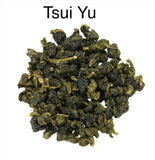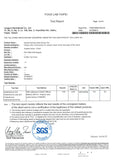Taiwan Tea TTES #13 Tsui Yu Taiwan Jade Oolong Tea Loose Leaves (300g/2 flavors)
jLteaco
Sale price
$17.60
Regular price
$19.36
Tsui Yu Taiwan Nantou Specialty-Jade Oolong Tea Loose Leaf
Item: Tsui Yu Jade Oolong (Wu Long) Tea
Pack size:
150g of each loose leaf in 2 vacuum-sealed foil pouches
Cultivar: TTES #13
Flavors: Traditional Farming & Natural Farming
Features:
Plucking from Taiwan's peculiar Tsui Yu TTES #13 cultivar, in addition to stringent management of planting, Taiwan
Tea Reviews
Brewing tips:
The water used to steep this tea is about 85-90 degrees Celsius depending on an individual's preference. Use the ratio of 1g to 50cc (or 1g to 25cc), the first infusion time of about 6 (or 3) minutes is recommended with more or less time depending on the desired concentration. As a rough guide, the higher the temperature of the water or the greater the number of leaves used, the shorter the steeping time should be. The tea leaves should be uncurled for full flavor.
For ultimate enjoyment, a traditional Chinese Yixing teapot is recommended for loose oolong tea. The teapot should be half-filled with leaves and initially steeped for 15 seconds (depending on an individual's preference) with the steeping time increased by an additional 5 seconds for each successive steeping. The leaves may be steeped multiple times.
Payment:
We accept PayPal only.
Return Policy:
No returns are accepted on food items.
I used my usual method for the gaiwan, with about 2g of leaf, a rinse, and 30ml of water at 85 degrees Celsius to begin infusing. I add water in 15ml increments as needed, making sure the leaves have space to open. I began with a 10 second infusion time, adding 5 seconds per steep for a pattern of 10, 15, 20, etc.
This is another oolong that produces a pale yellow liquor – very pale, with just a hint of green. The aroma is sweetly floral, reminding me of springtime and cherry blossoms, and maybe peaches, and a light mineral taste. The actual vegetal greenness of this oolong seems a little subdued, with the fruity and floral aspects front and center. The liquor is smooth and creamy, and my first impression is of delicacy. That’s the word I’d sum this tea up with, delicate. Sweetly floral and fruity, delicate and somehow light and airy.
The sweetness reminds me of cherries and peaches, also honey. It seems to intensify over the first 4 infusions. There’s something very clean about this tea, and also something like perfume. By the fifth infusion, the mineral note started to come forward more. The floral and fruity notes begin fading after infusion 7, leaving my final two infusions tasting more of minerals and foggy mountain air. This is a complex and intriguing cup, as I’ve come to expect from Fong Mong Tea.
In the teapot, with a 6 minute infusion time, I find this tea retains the delicate nature I found in the gaiwan, but with a bit more of a fruity nose and palate.
I used my usual method for the gaiwan, with about 2g of leaf, a rinse, and 30ml of water at 85 degrees Celsius to begin infusing. I add water in 15ml increments as needed, making sure the leaves have space to open. I began with a 10 second infusion time, adding 5 seconds per steep for a pattern of 10, 15, 20, etc.
This is another oolong that produces a pale yellow liquor – very pale, with just a hint of green. The aroma is sweetly floral, reminding me of springtime and cherry blossoms, and maybe peaches, and a light mineral taste. The actual vegetal greenness of this oolong seems a little subdued, with the fruity and floral aspects front and center. The liquor is smooth and creamy, and my first impression is of delicacy. That’s the word I’d sum this tea up with, delicate. Sweetly floral and fruity, delicate and somehow light and airy.
The sweetness reminds me of cherries and peaches, also honey. It seems to intensify over the first 4 infusions. There’s something very clean about this tea, and also something like perfume. By the fifth infusion, the mineral note started to come forward more. The floral and fruity notes begin fading after infusion 7, leaving my final two infusions tasting more of minerals and foggy mountain air. This is a complex and intriguing cup, as I’ve come to expect from Fong Mong Tea.
In the teapot, with a 6 minute infusion time, I find this tea retains the delicate nature I found in the gaiwan, but with a bit more of a fruity nose and palate.




